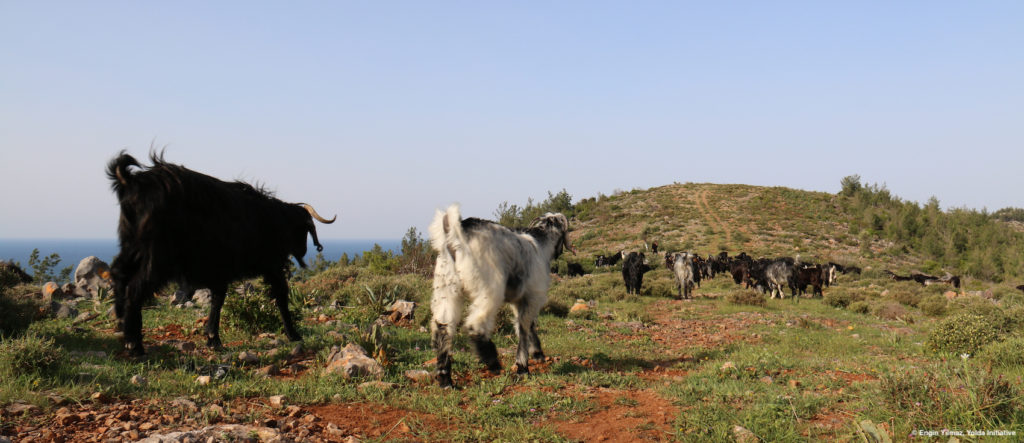El camino hacia unos sistemas alimentarios más justos y sostenibles empieza por la relación entre consumidores y productores".

Yolda es una organización de conservación de la naturaleza creada en 2015. Desde el principio, Yolda se ha centrado en las prácticas culturales y los sistemas de producción tradicionales que benefician tanto a la conservación de la biodiversidad como a la mitigación de la crisis climática y la adaptación a ella. Engin Yılmaz, director ejecutivo de Yolda, nos cuenta más sobre la importancia de los conocimientos ecológicos tradicionales y el valor de las relaciones entre consumidores y productores.
Pastoreo móvil
Trabajando a nivel internacional, Yolda colabora con comunidades de pastores móviles de distintas regiones para comprender y difundir los beneficios de esta práctica para la biodiversidad y la acción climática. Las tierras de una de estas comunidades, llamada Sarikeçili, se han unido recientemente al proyecto Foodnected como lugar piloto. Recorren un área geográfica de 300 km a través de Turquía, invernando en los pastos de las costas meridionales y veraneando en las tierras altas de los montes Tauro.
Pastoralismo, explica Engin, es una forma de ganadería, de cría de ganado (en su mayoría especies herbívoras) y, lo que es más importante, es totalmente diferente en esencia a los sistemas de producción ganadera intensiva. Utilizamos la palabra móvil para englobar las múltiples formas en que las personas se desplazan con el ganado, a diferencia del pastoreo sedentario. Así pues, el pastoreo móvil se refiere a las múltiples formas en que las personas se desplazan por los paisajes con el ganado".
La definición de pastoralismo móvil puede variar, ya que depende en gran medida de la topografía de la zona por la que transitan estas comunidades, del clima, del contexto socioeconómico, etc. Sin embargo, en todos los escenarios, este sistema de producción tradicional encierra beneficios para la conservación de la biodiversidad y los esfuerzos de mitigación y adaptación a la crisis climática.
Gracias a su movilidad, estas comunidades nómadas garantizan la conectividad entre distintos hábitats y, por tanto, apoyan a otras especies en lo que respecta a la conectividad funcional y estructural. Tomemos el papel que desempeñan en la dispersión de semillas: Los animales comen plantas, transportan las semillas de estas plantas a través de sus pelajes, vellones, pezuñas y excrementos. En un estudio científico realizado en España, se demostró que un rebaño de 1.000 ovejas trashumantes transporta casi 200 millones de semillas ingeridas a lo largo de 1.500 km. Además, la huella de carbono de estas comunidades es muy baja, sobre todo por su movilidad. Utilizan niveles muy bajos de combustible. Su vida está adaptada al clima. Cuando abandonan un lugar, dejan que la vegetación se regenere. Y, lo que es muy importante, contribuyen a preservar el patrimonio cultural".
Conocimientos ecológicos tradicionales
La conservación de los conocimientos tradicionales es uno de los valores fundamentales de los Foodnected y abarca aquí diversas interacciones entre las comunidades y la naturaleza, así como las interacciones dentro de la propia comunidad. Esto incluye, por ejemplo, la gestión de rebaños, el bienestar animal y humano, el conocimiento de la fauna y la flora, la transmisión de conocimientos, etc.
Para ilustrar la importancia de estos conocimientos, Engin pone el ejemplo de las interacciones entre las comunidades y los lobos. En los Pirineos franceses ya no quedaban lobos. Así que el gobierno tomó medidas para reintroducir lobos en las montañas. Esto creó un conflicto entre las comunidades trashumantes de allí y el gobierno francés. Uno de los aspectos importantes de este conflicto fue que las comunidades ya no poseían tantos conocimientos ecológicos tradicionales como en el pasado para afrontar y mitigar los conflictos contra estos depredadores, por lo que la experiencia resultó muy traumática para ellas. En Turquía hay 7.000 lobos y las comunidades nómadas no consideran traumático ninguno de ellos, porque llevan siglos viviendo así. Utilizan herramientas particulares contra ello, como los perros. También tienen perros en los Pirineos franceses, pero en Turquía aún se sabe mucho sobre cómo elegir la raza adecuada, cómo adiestrar correctamente, cómo gestionar la manada de perros y cuántos perros debe haber en una manada. Por supuesto, todo esto varía en función de la región y el entorno. Por eso creemos que es necesario conservar este tipo de conocimientos. Estas comunidades llevan siglos viviendo en la incertidumbre y su vida cotidiana está adaptada para responder a los cambios. También hay sabiduría en ese conocimiento que puede ayudar a desarrollar respuestas a crisis como una pandemia".
La relación entre productores y consumidores
Desde su fundación, Yolda, al igual que Foodnected, ha intentado reducir la distancia entre productores y consumidores. En nuestro caso, acortar las cadenas de valor no significa vender y comprar localmente, ya que las comunidades se desplazan largas distancias. Significa intentar evitar a cualquier otro actor a lo largo de la cadena y hacer que consumidores y comunidades compartan la misma visión de la producción y el consumo de alimentos".'
Yolda considera que el ser humano es una parte esencial del ecosistema y que la relación entre consumidores y productores es crucial para lograr sistemas alimentarios más sostenibles y justos. No podemos basarnos en una dicotomía entre naturaleza y cultura. La naturaleza aporta beneficios a la cultura, pero la cultura también puede aportar beneficios a la naturaleza. Y eso es lo que esperamos de los consumidores: que lleguen a esta misma forma de pensar. Esto nos ayudará a abogar por un marco jurídico adecuado que apoye a los productores sostenibles en lugar de a los sistemas de producción industrial, y, entonces, podremos tener un impacto a escala regional, nacional y mundial. Esto tiene que empezar por la relación entre consumidores y productores".
